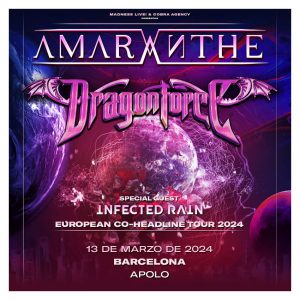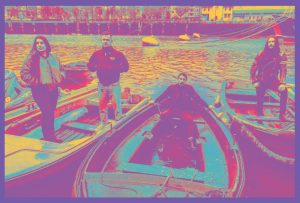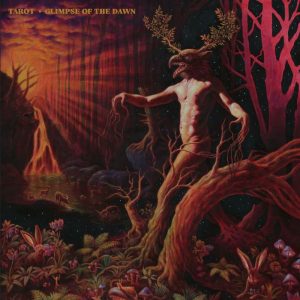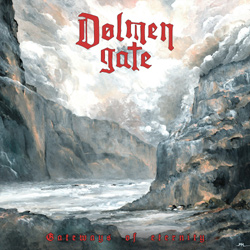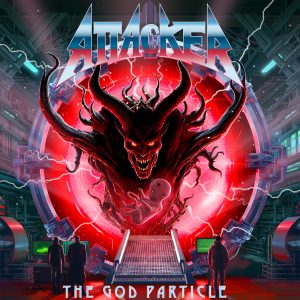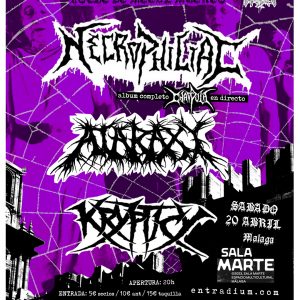VASTUM (EN)
– Hello and, first of all, thanks for taking your time to answer to our questions. How’s eveyrthing going in the band’s camp?
D: Good. It’s exciting to be releasing our newest record.
– Why «Vastum»? What’s the non-literal meaning and origin? How does it relate to you as a band?
L: Vastum, from the Latin, “waste”; for me it conjures up images of bodily waste from which we all come from and to which we return as corpses. Lyrically we write about the human experience, in all its baseness, physically and psychologically.
D: Waste, excess, shit, blood, semen, orificial purge… It’s connected to the mystical, philosophical, and psychoanalytic concepts I/we write about.
– «Hole Below», «Orificial Purge»… What is the symbology of these «holes»? Is it metaphorical? What is the significance behind your new album’s title?
D: Hole Below refers to hell, the unconscious, the orifices, the list could go on… But it’s also about a fixation with holes into which the self can fall, which is why Narcissus is on the cover. The image of the self gives us an illusion of the hole having been filled, but the reason we return to the image is because part of us knows that the hole remains. We become so preoccupied with the image that eventually we fall into the hole that the image cannot fill. This may lead to some kind of limit experience (rapture, ecstasy, florid psychosis, dissociative trance), and the lyrics to “Hole Below” weirdly recount what a dissociative fall into such a hole might look like.
The song “Orificial Purge“ is about humanity as a divine accident or a kind of excrement that’s divinized due to its role in phylo- and theogenesis. The concept is inspired by Pseudo-Dionysus’s The Divine Names and Bataille’s Inner Experience. But I wouldn’t say the album is a concept album; each set of lyrics stand alone, even if they’re connected in certain ways. We explore similar themes on all of our records: evil, sin, eroticism, mysticism, perversion, dissociation, unconsciousness, psychic violence (patricide, castration, mutilation, dismemberment, fragmentation).
– On the other hand the cover artwork may be the most abtrasct looking so far. What does it represent?
D: A hole, a passage, a ritual, a purge, an orifice, a church… It disturbs the viewer because its meaning is unstable and unclear, why is why it’s perfectly in line with who we are as a band.
– Musically, your sounds seems to evolve continuously into something darker and slightly more technical. Is evolution a constant process?
L: There is a core sound to Vastum that remains unchanged since Carnal Law, and we continue to evolve at the same time, ever reaching further into the dark. Evolution is constant but slow, and often unfolds unconsciously.
– I would dare say the atmosphere is one of the key elements in VASTUM, do you put a conscious effort on it while you are in the songwriting process?
L: Absolutely. Atmosphere is everything to me when making music. When I write a Vastum song, I keep both the vertical (melodic and ambient layering) and horizontal (overall song structure) dimensions in mind to create something simultaneously frightening and hypnotic.
D: We do, although we try to achieve atmosphere in different ways. Hole Below has more reverb than Orificial Purge, but I think the atmosphere remains.
– It is a vile, unsettling kind of ambience. What emotions or thoughts would you like to induce your listener in with it? What feelings do you want to instill?
L: The ambiguity and horror of the unknown: the Void.
D: Chiefly anxiety but also horror and even laughter. We write about tragedy but not without remembering the potential for anguish to pass into ecstasy, or for the tragic to pass into the comic.
– You have also some other personal elements that make you stand out from other ugly, traditional Death Metal bands, like the weird vocal patterns but, what could you say defines the sound of VASTUM?
L: I think it’s the unique vocal performance and lyrical content, combined with memorable guitar riffs and leads that are the defining elements of Vastum’s sound.
D: Hard to say. I do think it’s distinctive somehow. We play regressive, old, primal death metal with an emphasis on riffs and atmosphere, and we often like to play slugg(athor)ishly (not too slow or too fast).
– Is everything well-thought on your records? As considering the focus there’s on the atmosphere, I understand a single note out of place can change the whole mood of a song.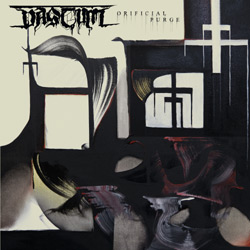
L: We think our songs through well in advance as well as allowing ourselves to be spontaneous when recording. I feel spontaneity in the studio is very important and also the most fun part of recording as a band, to allow oneself to bring unexpected elements into a song that add greater dynamics.
D: Yes and no. Creating something involves not knowing what you might create. If it’s too planned, it’s not much of a creation. There needs to be room for accidents, missteps, and uncertainties.
– And how is the songwriting process? I mean, do you paint a mental picture and then work around it to make everything fit?
L: Inspiration for me comes at unexpected times. I never know that a new song is coming until I pick up the guitar and start playing. Lyrics, on the other hand, I will have visions or images in my head first that become translated into words.
– As for your lyrics I read they are (some) based on personal experiences, but aren’t touched in a too obvious way. What are some experiences that have inspired some of the lyrics on «Orificial Purge»?
L: “Abscess Inside Us” is a story of relationship dysfunction through my perspective.
D: I’ve discovered an endless capacity for violence and victimization through introspection. The experiences I write about may or may not autobiographical – I don’t know. I’m not sure what happened in my life. I’m not totally sure if I have memories, and my uncertainty might say more about my past than anything I could possibly remember. I have are fantasies, dreams, feelings, thoughts, some of which keep me up at night. I might be dreaming what happened to you but thinking it happened to me. Freud writes about the fantasy of a child who is beaten. The identity of this child is complicated by fantasy. The child is you and me at once. I’m the spectator who watches the beating. I’m the father who beats and the child who is beaten. I write about confusion. I write about being assaulted by an it, a thing, the specter that is my unconscious.
– They also have a certain sexual component that is truly horrific, and I personally high appreciate the way you approach them, as in extreme Metal sex is often approached from a very mysoginistic and violent perspective. It is a really mysoginistic kind of fantastical imagery. What are your thoughts on this? As it seems people are more aware nowadays or aren’t that afraid of speaking out anymore, but feels like most metal fans can’t draw the line between calling out and censoring.
L: Our lyrics are definitely violent, incisive and are intended to provoke a visceral reaction, and are also self-reflective. We own the violence we speak about. I think calling out and censoring is a very important distinction to make. I’m all for continuous conversation and increased understanding of ourselves and others; censorship is the opposite of that. It’s also a perverse thing that only bands with women in them seem to be asked about misogyny in interviews, and this question isn’t usually directed at male-only bands. In this way, women are burdened both with being the survivors/objects of violence as well as made responsible for speaking up about it at the risk of being attacked again. In this way the cycle of violence perpetuates uninterrupted.
D: I very much agree with Leila. I also think genres like death metal have a complex relationship to the body. What might appear misogynistic could also be a celebration of abjection or vileness that paradoxically supports a darker side of sexuality and gender. I think we have to avoid reductive thinking. There’s a misogyny in everyone because society is structured misogynistically. While I think it’s something to examine and understand, I don’t condemn the hatred and violence that we’re all capable of. I do, however, condemn the enactment of that violence out of a narcissistic need to assert one’s superiority. I don’t think anyone should censor themselves; I’m not interested in policing other peoples’ behavior. But if people do things I don’t agree with, I may challenge them when they do it. The reason why I challenge them is never transparent. Why we do what we do always exceeds ideology and identity. I don’t know why I do what I do; I only know that I’m summoned to do it. Any rationale comes later.
– So to speak, lyrics deal with real-life horrors, drawing from different kinds of abuse but there is also a lot of self-reflection I would say, this is why I’m sure you have already thought before about what I just addressed on my previous question. Do you put an effort in trying to take care of language? Do you somehow create an emotional catharsis through your lyrics?
D: Maybe there’s catharsis, though I’m not particularly drawn to that concept because it suggests there’s a ‘thing’ that I release through writing. Rather than a release, I’d say writing helps me deepen my relationship to the unreleasable. It underscores how impossible the removal of the ‘thing’ is. Writing is more agonizing than cathartic, but I feel somewhat changed by undergoing the agony. I think what is written is a record of my unconscious, though I don’t think my unconscious could ever be revealed through that record. While I try to write as free associatively as possible, there’s probably more censorship than freedom in what I write.
– So in a way, is every album you release a «purge»?
D: In a sense, yes, but following from what just said, that purge is also impossible insofar as its object is abject, or is a thing that is not inside or outside but that haunts the borders of psychic and corporeal life, eluding my grasp and so eluding every attempt to expel it as if it’s my own.
– All this about «Orificial Purge» being said; how coud you describe it in just 3 words?
L: Hypnotic, violent, engulfing.
D: It not I.
– Maybe since the CORPUS demo you haven’t had any Crust or Punk influences in your music, but your social values come from Punk. Nowadays that Metal seems to be facing a tough period, dealing with a lot of bigotry, how important do you consider is to make a stand and call out on shitty behaviors?
L: There has always been racism, sexism, homophobia in punk and metal and everywhere else. We can’t assume social values based on musical tastes. People should allow themselves the choice to call something out or not, and as I alluded to before, often the victims of violent behavior are expected to do the work of calling out at the threat of risking more violence to themselves, leaving the perpetrators unquestioned and not responsible.
D: I’m not as interested in other peoples’ behavior as much as I am my own. I think it’s important for people to heed to what moves them and respond to being moved as if it’s their duty, but I wouldn’t say this is about ‘calling people out’ or standing up for what’s ‘right.’ It’s also not about ideologies with which I might consciously identified. It’s about responding to a summons from beyond, a summons that moves me to act in the interest of that which I am not yet but might become. Heeding to desire is not about virtue or righteousness, nor is it about belief and ideology. It’s about deepening my relationship to the unknown, and often the summons to act is about addressing any forces that might interfere with that deepening.
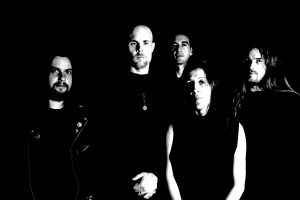
– In fact I read even though most of your fan base consists on hetero males, you have a lof of female and LGTBQ fans too. Do you think Metal needs more diversity in its festivals, bands, etc.?
L: There is more diversity in the underground metal world today than ever, and greater diversity always comes with its own struggles of inclusion/exclusion and hierarchies within, so it’s all easier said than done. If we want more diversity, we need to do the work internally to allow for it, and not everyone wants that, and many are afraid of change.
D: This is an important but difficult question to answer. Rarely do I appreciate answers to questions like this that take a ‘right’ or ‘left’ stance. Such stances can easily become moralistic and reactional, which means there’s an unwitting emotional identification with the same psychological and political force that those stances may be trying to oppose. Opposition might lead us to feel good about ourselves for knowing and doing what we’re convinced is ‘right’ (i.e. promoting ‘diversity’), but it doesn’t necessarily change anything structurally. It’s essentially a deadlock, a mirroring in which two forces are reacting to each other but neither is truly acting for itself. Certainly I encourage a diverse crowd, but cultural diversity doesn’t necessarily mean metal would become more open minded. As a queer person, I can be very closed minded and full of hate. I can tend toward envy, reaction, and resentment when I’m not aware of these tendencies in myself. So if diversity means a bunch of people who are culturally different but psychologically self-unaware, then diversity wouldn’t necessarily be ‘good,’ nor would it actually be diverse: this would be a world of singularity, a world all about me. To my mind, women and LGBTQ people have been drawn to darker aesthetics since time immemorial – the darker, more abject side of society is their lot in life after all – but they’re typically kept from exploring these aesthetics due to various forms of internal and external gatekeeping. What this says to me is that they represent a kind of queerness that’s already inherent to metal, a left hand path to be sure, and I guess I’m more interested in drawing that out than in promoting some sort of multiculturalism that could be tokenizing, ghettoizing, and essentially cosmetic. I think this involves a change in consciousnessness among people in the metal scene generally, and a growing recognition that metal has always reveled in the abjection that fems and queers embody. This change might open the door for women and LGBTQ people to come in – to come in to a world in which they, ironically, always already belong – but that’s different from finding more women and LGBTQ people to prop up as exemplars of how metal is or could be diverse. This isn’t to say that the latter approach shouldn’t be pursued in some form, but it is to say that it’s insufficient for generating a more diverse scene. The latter approach also risks the creation of metal ghettos where every band who has a woman or queer are siloed. Just because I’m queer doesn’t mean Vastum is a ‘queer’ or ‘left’ band. We’re a death metal band interested in mind and body sources of horror. We’re interested in how whatever you hate or want to expel from your mind and/or body isn’t going anywhere. The abject is you, and the closer you draw to the abject, the more open you become to some form of transcendence.
– And finally, what are now your near-future plans? With VASTUM and with any of your other projects.
L: “Orificial Purge” will be released on October 25 through 20 Buck Spin on all formats. Vastum will perform Shadow Frost Fest in February 2020 in Frederick, Maryland, and will tour later in the year. My solo ensemble will also perform at this fest. Fyrhtu, my new synth duo with Nathan A. Verrill of Cardinal Wyrm, will be releasing our debut “No More Days in the Light” on November 2 via Black Horizons, on tape and digital formats. We both also have a new postpunk/death rock band, Terebellum, with Joe Hutton of Hammers of Misfortune and Sam Foster of Saros and Weakling, that will be recording our debut album later this Fall.
D: Writing with Acephalix; playing some shows with Vastum; doing vocals for Draghkar’s next recording; and working on Insectuous, an industrial side project with my brother.
– That’s all from our side, thank you once more for answering to our interview. If you’d like to add some final words; feel free to do it.
D: Thank you for the thoughtful interview.
Tania Giménez
tania@queensofsteel.com

